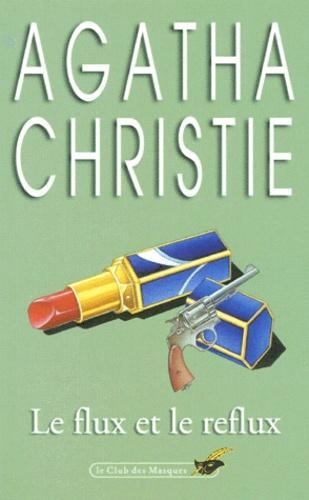mass market paperback, 253 pages
French language
Published Jan. 3, 2008 by Librairie des Champs-Elysées.

mass market paperback, 253 pages
French language
Published Jan. 3, 2008 by Librairie des Champs-Elysées.
Taken at the Flood is a work of detective fiction by British writer Agatha Christie, first published in the US by Dodd, Mead and Company in March 1948 under the title of There is a Tide . . . and in the UK by the Collins Crime Club in the November of the same year under Christie's original title. The US edition retailed at $2.50 and the UK edition at eight shillings and sixpence (8/6). It features her famous Belgian detective, Hercule Poirot, and is set in 1946. The novel tells a story of post-World War II England, when life seems turned upside down, with the relief of the end of the war, the changes from who lived and who died, and the economic challenge of post-war life, playing out for one family in a village not far from London. The detective Superintendent Spence is introduced in this novel, with …
Taken at the Flood is a work of detective fiction by British writer Agatha Christie, first published in the US by Dodd, Mead and Company in March 1948 under the title of There is a Tide . . . and in the UK by the Collins Crime Club in the November of the same year under Christie's original title. The US edition retailed at $2.50 and the UK edition at eight shillings and sixpence (8/6). It features her famous Belgian detective, Hercule Poirot, and is set in 1946. The novel tells a story of post-World War II England, when life seems turned upside down, with the relief of the end of the war, the changes from who lived and who died, and the economic challenge of post-war life, playing out for one family in a village not far from London. The detective Superintendent Spence is introduced in this novel, with whom Poirot works again in a few more stories. The Cloade family, brothers and one sister, have had many abrupt changes from the war, losing their brother Gordon in a London bombing raid shortly after his unexpected marriage to a young widow. One son is lost to fighting, a daughter returns from serving as a Wren, and another son seems to be making a successful venture at farming, despite losing his partner in the venture to the war. When the Wren Lynn returns, her interrupted engagement to her cousin resumes, with troublesome interruption from the brother of Uncle Gordon's widow Rosaleen. A stranger in the village, using the literary name Enoch Arden, blackmails David Hunter and is soon found murdered. Hercule Poirot is called in. Richardson found the "doubly twisted" plot, to be "ingenious enough", but for him, "the quintessential zest, the sense of well-being which goes to make up that Christie feeling, is missing." Another reviewer was more pleased with the novel, saying that Poirot solves the mysteries "with all the acumen that has endeared him to Agatha Christie fans. Fantastic and topping." A review in 1990 was pleased to find a Christie novel tied distinctly to a specific year and world event, but had a more complex commentary on the novel as a whole, calling it a "Compulsive reworking of Tennysonian and Christiean themes, and pretty high up in the range of classic titles."